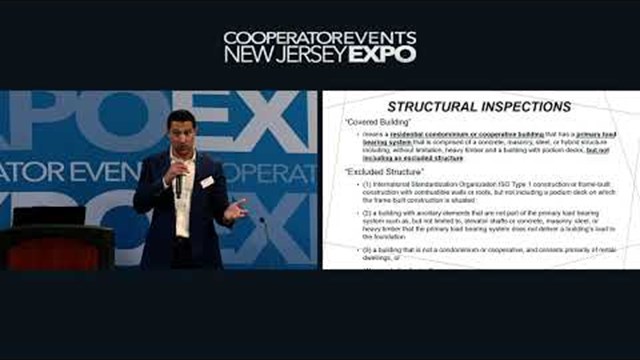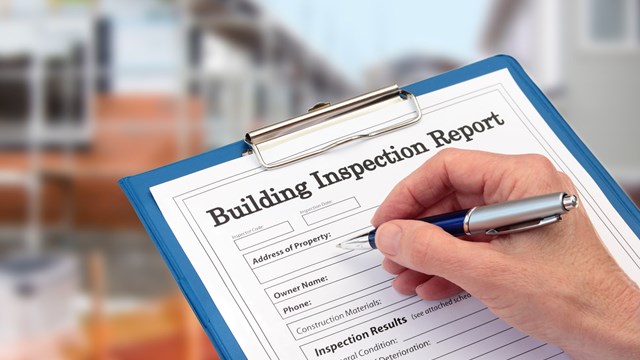Whether living in a crowded high-rise or a sprawling suburban community, when it comes to condos, co-ops and homeowners’ associations, safety is paramount. From management to the board to fellow residents, it falls to everyone to show concern for their fellow neighbor. It also, oftentimes, is the literal law of the land, as compliance with many safety standards is mandated both locally and federally. It’s imperative that an association be intimately familiar with these standards, the schedules by which building components need to be inspected and evaluated, and the outside vendors which, when necessary, must be called upon to ensure that everything is in working order.
Board Diligence
It falls within a board’s fiduciary duty to maintain, repair and replace common elements in a condo, or common areas in a non-condo.
“Community associations consist of complex components that need to be inspected, both during transition and as part of regular maintenance,” explains Stuart J. Lieberman, a shareholder with law firm Lieberman & Blecher, P.C., in Princeton. “To cite an example, storm water systems are a component that can be very intricate. Many storm water systems include ponds with aeration systems to avoid nasty septic conditions. Experienced storm water engineers usually undertake the design, inspection and maintenance of these systems.”
“Likewise, elevators must also be inspected and properly maintained,” Lieberman continues. “There are serious potential injuries that can arise if this does not happen, and most jurisdictions require inspections at specified intervals. Roofing, siding and swimming pools require similar devotion.”
“I incorporate inspections into an annual management plan by identifying the various needed services and then scheduling them as appropriate,” says Stephen DiNocco, a principal with Affinity Realty & Property Management in Boston. “This includes all central services, fire safety equipment and security features.”
Doug Weinstein, Vice President of the Project Management Group of AKAM Living Services, which has dual headquarters in New York City and Dania Beach, Florida, uses elevators as an example for how best to approach inspections. “There are mandated elevator inspections that have to occur, whether that be on a yearly basis, every three years, five years... whatever a particular code dictates,” Weinstein offers. “In addition, whether you’re dealing with an elevator or a boiler or any piece of equipment that requires a mandated safety inspection, you have to confirm that it’s included in the maintenance agreement with the relevant vendor. And what’s more: it’s not enough to be included in the agreement; you have to ensure that the maintenance is being performed.
“What we try to do as managers is to create – for lack of a better term – a tickler file for all of these to ensure that an association is on top of their vendors, and that the vendors are performing whatever needs be performed to carry out that inspection and get a permit, or whatever it may be in an individual case, renewed,” Weinstein adds.
Screening Vendors
In order to achieve a safe space for residents, staff, visitors and anyone else who may find themselves strolling by, it’s imperative that a board find the right vendor for a particular job.
Oftentimes, as DiNocco acknowledges, it can fall to the property manager to ascertain what needs be maintained and who is appropriate to do so. “The property manager should be able to make a recommendation based upon personnel skill and experience, as well as the size of the project and necessary funding,” he says.
Weinstein agrees: “The key really is to make sure that the manager knows when inspections are due and when permits must need be renewed, then follow up on that. Don’t assume that a vendor is going to do it on their own.”
Depending on what needs to be inspected or repaired and its uniformity, vendors may be in abundance, but, in specialized situations, an association may find them scarce. Asking similar-sized associations for recommendations can help in the latter scenario.
Relatedly—returning to the earlier elevator example—Weinstein suggests looking into the type of buildings a vendor has worked with in the past. “Do they mostly gear toward commercial high-rise office buildings? Or do they deal with your association’s type of residential property?
“Also, with elevator service companies, they have a group of mechanics that work territories,” he adds. “So you want to ask how many buildings in your particular area do they handle?”
And, in regard to scheduling inspections or service, Weinstein recommends a “90-60-30 schedule.” “Start bugging them 90 days before something is due,” he advises. “Then follow up at 60, and, if need be, stress the urgency if you reach 30 days. Hopefully that’s the last time you’ll need to remind them.”
Public Safety
While in the suburbs, the likelihood that something will come careening off a building exterior and strike a passerby is minimal, but, in the city, it is a major concern. Anything that can cause an injury, whether it from the aforementioned scenario, a trip-and-fall, or anything else that can afflict a person of any age must be considered and its risk minimized, if not eliminated.
“If it’s a high-rise building and the facade has started to deteriorate, that’s actually a liability to the association,” says Lynn Voorhees, Director of Community Association Services at DW Smith Associates in Wall Township. “Because if concrete or masonry chunks start falling, they could easily cause harm. So, you’re looking at two things here: one is degradation of the structural integrity of the building, and the other one is the risk of physical harm.”
In New Jersey, the requirements of facade inspections vary depending on what municipality the building is in. The state’s Department of Community Affairs (DCA) runs housing inspections every few years to make sure exteriors, as well as common spaces, are up to code. “If the DCA inspects your building and finds you in violation, they give you a time limit to get an estimate and repairs done, otherwise they can impose a fine,” says Brian Bolger, owner of Magnolia Development Group in Succasunna.
Beyond that, there are no other state maintenance requirements. New Jersey expects associations to handle ongoing upkeep on their own. Within the association itself, the board has the latitude to determine to some degree when inspections and repairs are carried out. While every state-sanctioned inspection has to be completed by the end of the year, some boards may want to time the inspection so it’s not performed right after the exterior had just been painted, for example.
Facade materials, weather conditions, and the age of the building in question will affect what inspectors are looking for when they analyze an exterior, but property managers should follow an established protocol to make sure corners aren’t cut, and any deterioration isn’t missed. “After the winter’s over, property managers should bring in one of their general construction contractors—someone familiar with the entire building envelopes,” says Bolger. “The contractor will do a walk-around each of the buildings and inspect all the key areas to make sure there’s isn’t any water penetration. This doesn’t involve the removal of any stucco or brick; if they notice a problem, they’ll make a note of the area, and put it on their spring project list.”
Generally, inspectors look for deflections, cracking and delamination in concrete framing, corrosion or deterioration of any steel or wood frame components, and evidence of water intrusion. They also may observe issues with windows, shutters, screen framing, accessories, piping systems in garages, and roofing systems where applicable (usually in associations in suburban areas). An inspection should also identify any cracks, spalling or rebar corrosion in masonry walls/balconies. And, additionally, roofs, floors, windows and exterior finishes are evaluated for deficiencies or any damages that may affect the safety and stability of the building or buildings.
“I recommend that my clients get a three-ring binder and take photographs of the areas that they’re monitoring whenever the seasons change,” adds Wayne Bellet, Owner of Bellet Construction Company, Inc. in New York City.“It doesn’t take much; it’s four times per year. You don’t need to rush into anything unless there’s an obvious cause, but keep an eye on the areas that concern you most. And I don’t mean just the facade; I mean the rooftop as well as the sidewalk. Curbs, driveways, door step-ups, railings... any component of the exterior of a building needs to be monitored, because it ages. This is unfortunate, but it’s realistic.”
Cost Versus Benefit
While constant monitoring and maintenance would be the safest option for any association, that’s rarely feasible, either in terms of time or money. A board must prioritize maintenance and work in accordance with its budget. But waiting too long to perform necessary work can lead to bigger headaches down the road.
“Associations should have adequate reserves established for common element repairs and maintenance,” says Lieberman. “Engineers are called upon to assist in determining whether adequate funds are being set aside every month to guarantee this obligation is satisfied, which, sadly, it often is not.”
Bellet compares a board’s due diligence to visiting the dentist. “You can postpone the more expensive things, but sooner or later it’s gotta get done. And there are simple things that equate to brushing and flossing, that may be annoying, but can help avoid rot, like caulking, or scraping metal and painting it thoroughly with primers and high-end paint.”
Finally, should a board find itself at a loss as to how often things need to be maintained and inspected, DiNocco notes that there are resources available. “Check equipment manuals and warranties; contact government agencies,” he recommends. So help is out there. Stay safe!
Mike Odenthal is a staff writer/reporter for The New Jersey Cooperator.







Leave a Comment